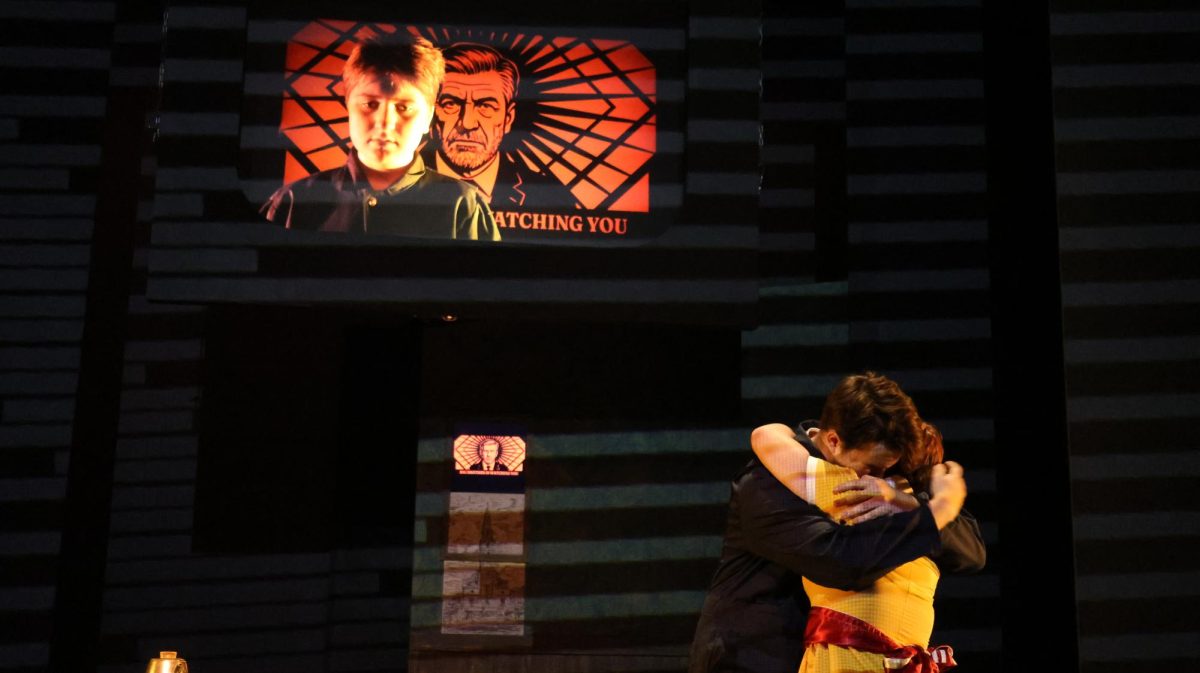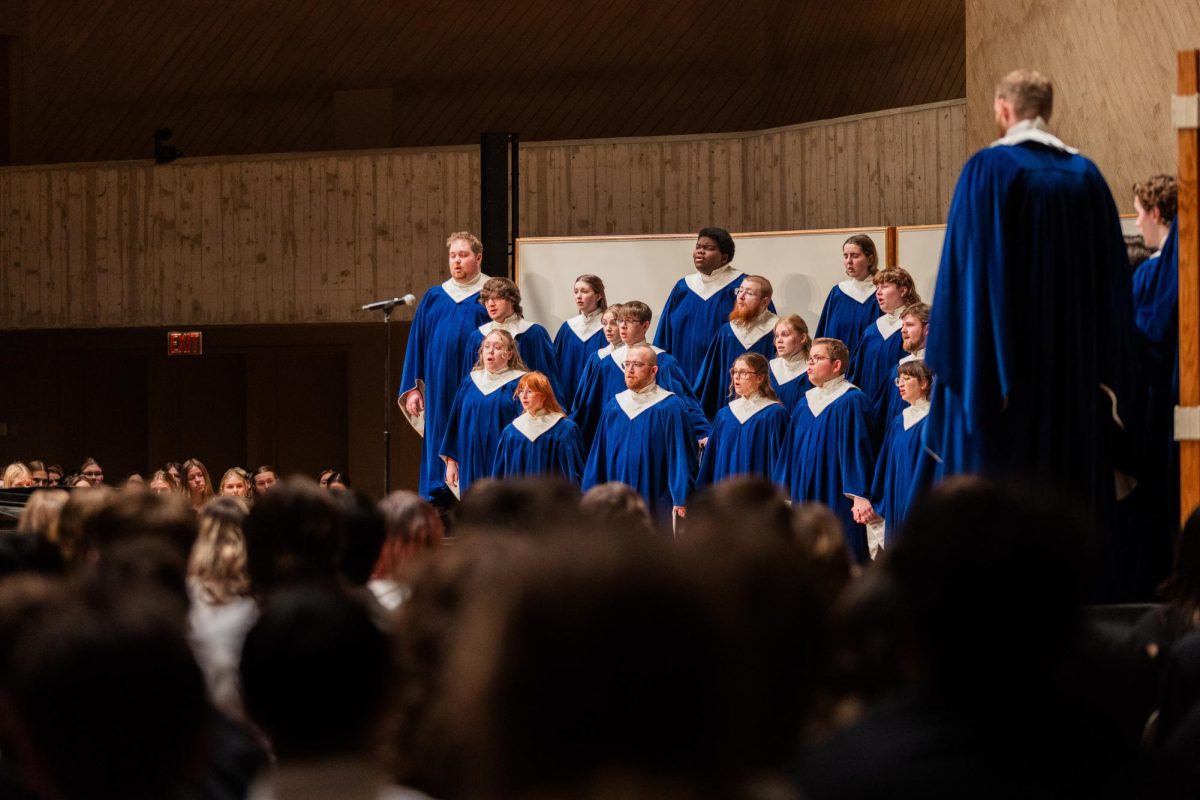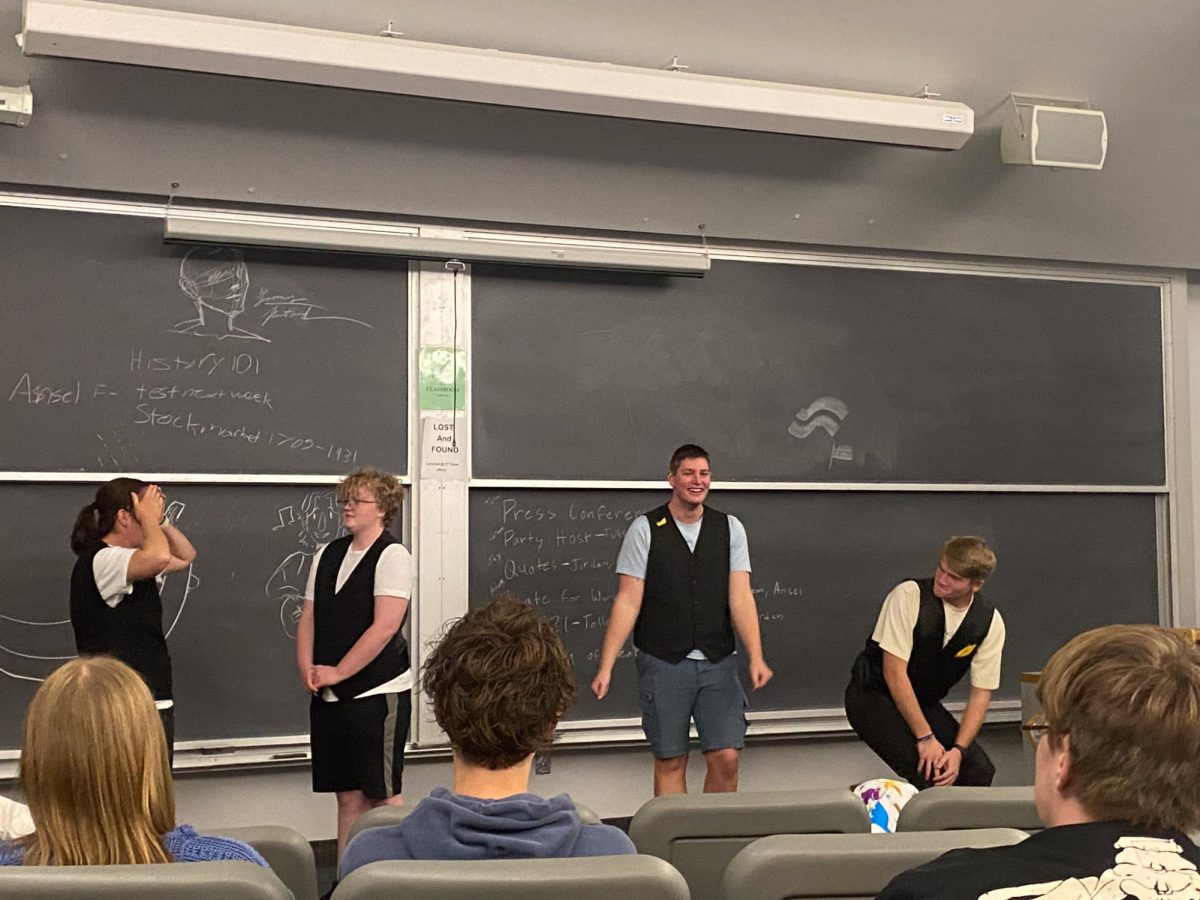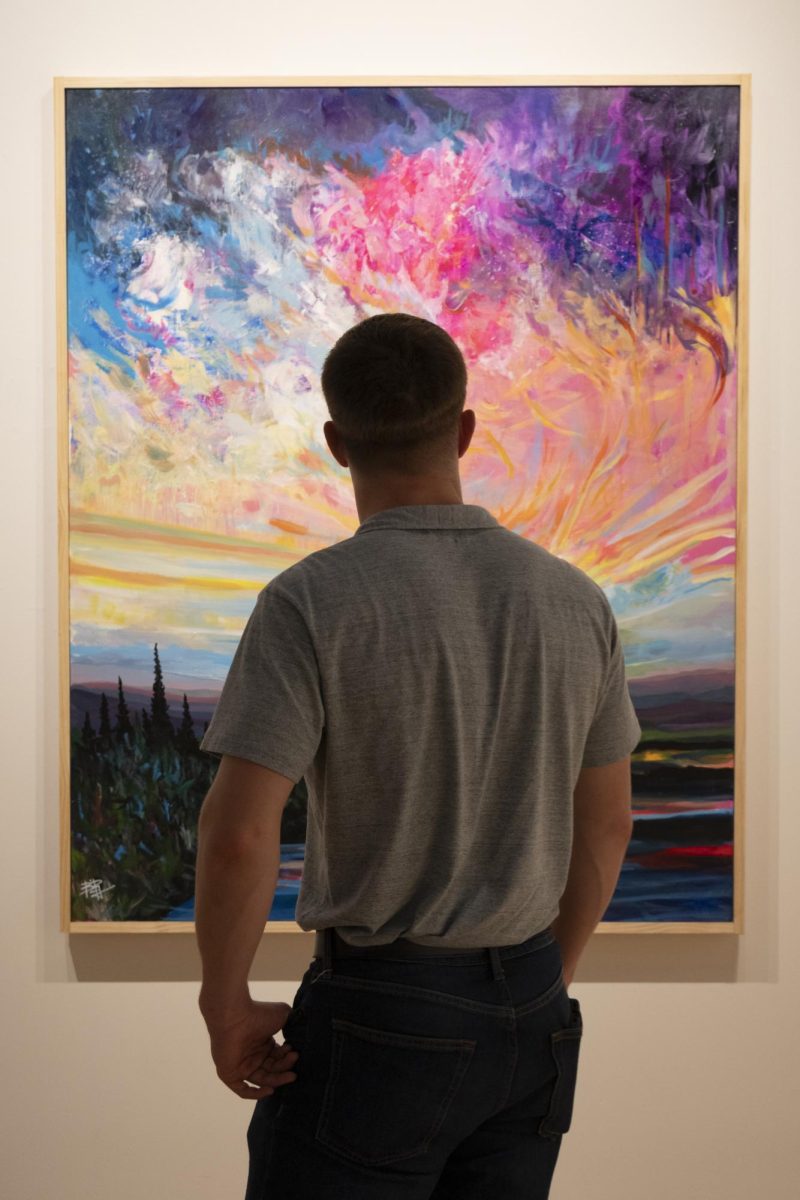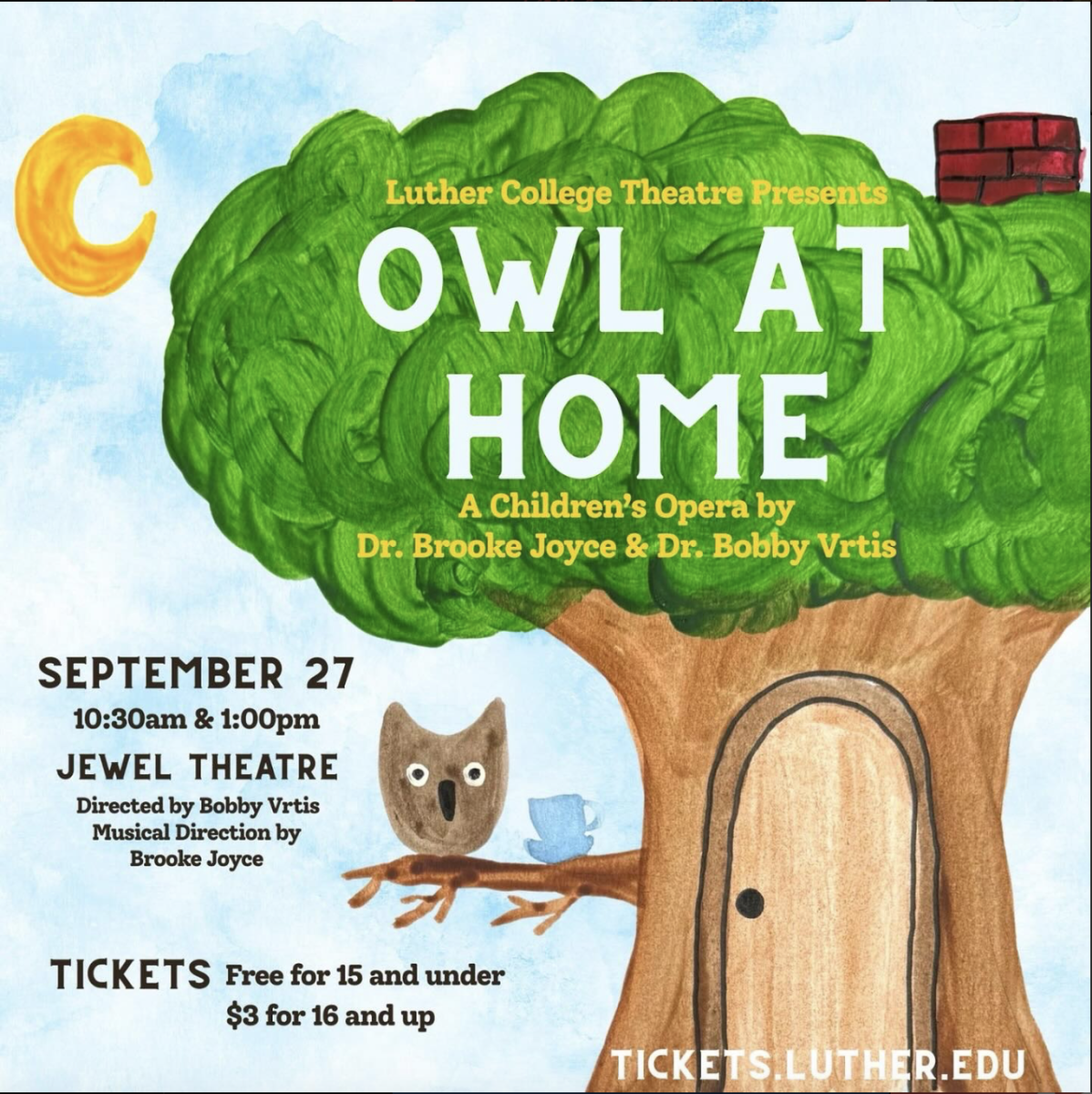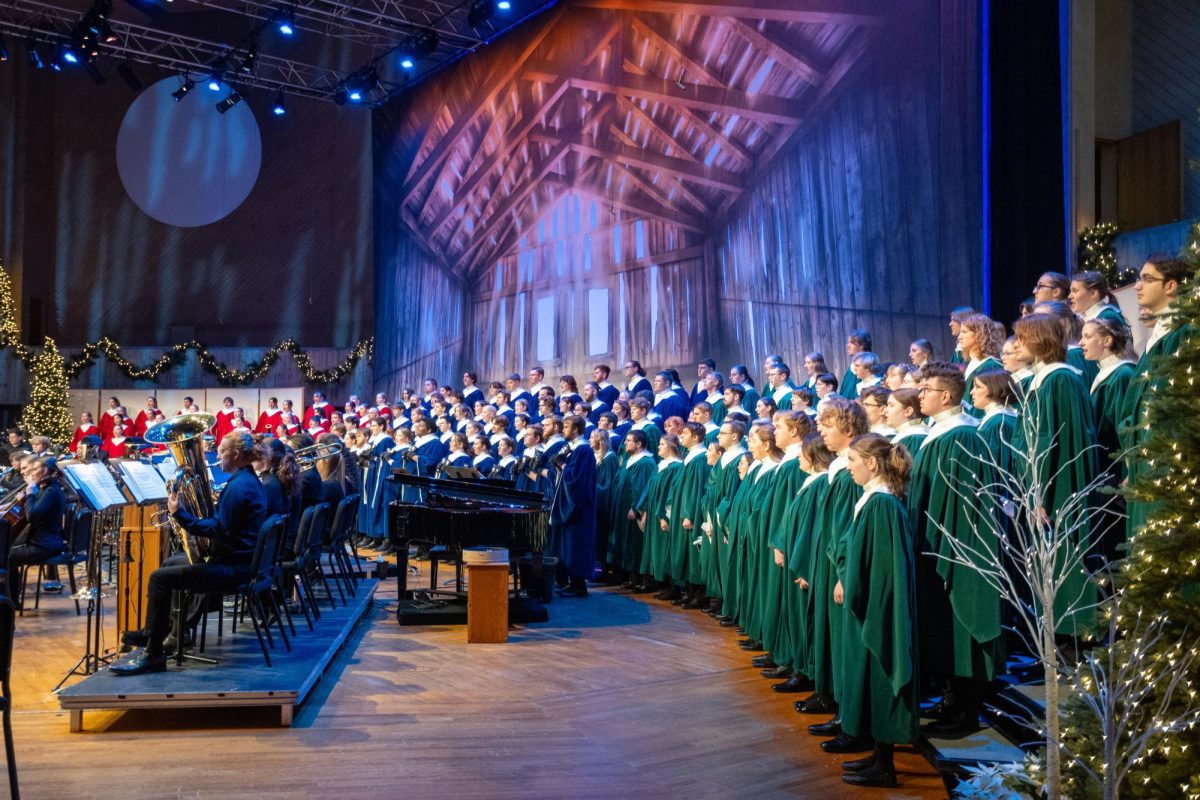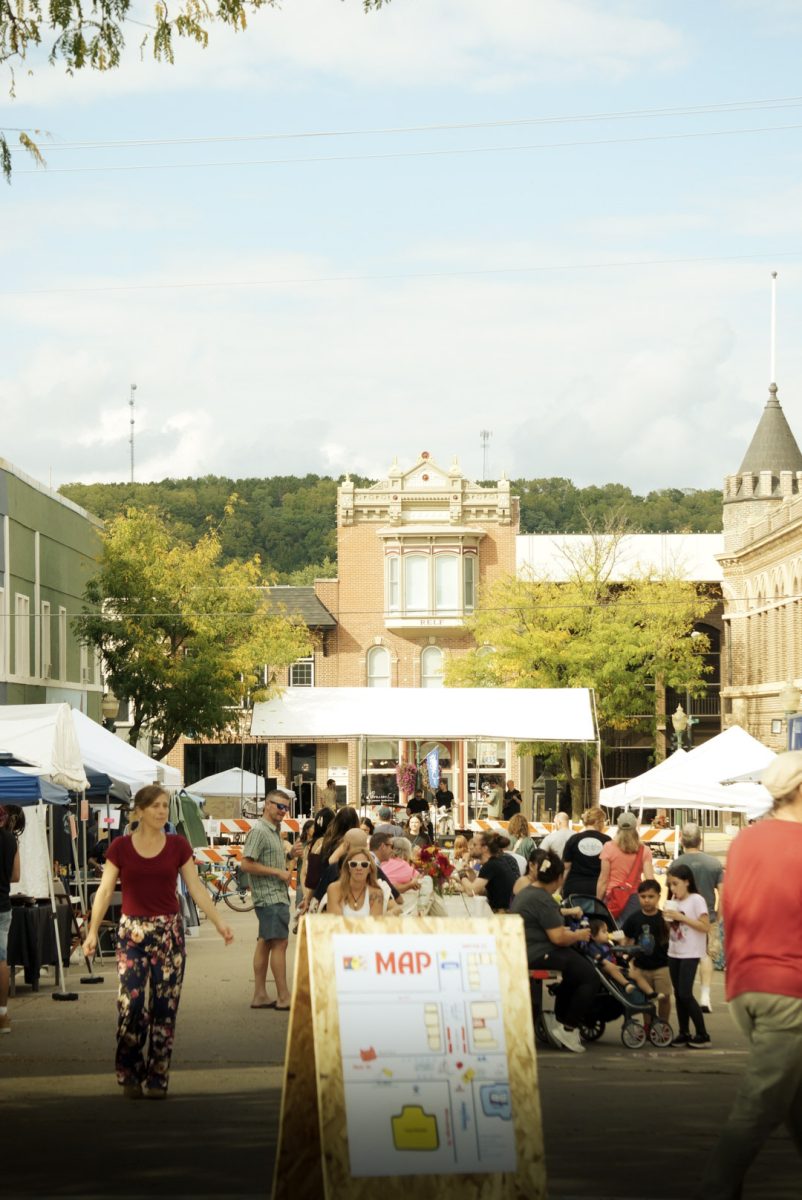As part of their fall semester programming, the drama students from the Luther College theater department performed the stage adaptation of George Orwell’s “1984.” The director, Jeff Dintaman, intentionally selected “1984” for its dystopian themes and relevant commentary on topics such as censorship.
The “1984” play is an adaptation of the book (and eventual movie) that made phrases such as “Big Brother” and “thought police” popular modern-day references. “1984” was written by George Orwell, the pen name of author Eric Arthur Blair, who was famous for his politically charged works. One of Orwell’s most recognized works is the renowned Animal Farm, an allegory that highlights heavy themes of anti-Stalinism. He published “1984” near the end of his life, in 1949. It is considered one of the first dystopian books, brimming with critiques of fascism and authoritarianism in the form of a surveillance state. At the time it was written, Orwell’s “1984” was a vision of a future gone wrong, and while the year 1984 may be decades in the past now, the themes of fascism and authoritarianism remain relevant to us in 2025.
“1984” is set in an industrial, authoritarian society that revolves around the “Big Brother” figure and his followers, who control every aspect of civilian life with an iron fist. In the world of “1984,” rebels are disappearing, language is being rewritten, historical records are being erased and ordinary items such as sugar or dresses are only found in black markets. The play follows Winston Smith, an ordinary worker with reservations about the government. The actor portraying Winston, Louis Breimhurst (‘27), detailed his character.
“[I’d describe Winston as] a middle-aged, white collar worker, and the lead. We kept using the word “milquetoast” [to describe him. Milquetoast is an adjective meaning feeble, insipid, or bland.],” Breimhurst said. “[Winston] is paranoid, a little neurotic, and obsessed.”
Despite being characterized as an average, rather meek person, Winston gets increasingly bold in defying the government throughout the play. One of his first defiances is getting married to his coworker Julia, portrayed by Katie Wilson (‘28).
“Julia is the love interest for Winston,” Wilson said. “She wants to be able to do what she wants, but with the state of the world she lives in, she can’t really do that, and so her whole deal is just wanting to be able to exist in the way that she wants to. If that means giving up something, she’s fine with that, but she wants to have bodily autonomy.”
As the play progresses, Julia and Winston become more radicalized until they are inevitably betrayed, caught, tortured, and “re-trained” to love Big Brother. The play ends on a somber note, as Julia and Winston are released to walk free, but they are now completely indoctrinated and feel nothing towards one another.
“1984” is fleshed out with multiple characters, including Syme, a devoted linguist who works diligently to translate classic literature to “Newspeak”, the newly crafted language designed to give the government even more control over the people.
Phoebe Billingslea (‘28), who portrays Syme, summarized “1984.”
“[“1984”] is about an authoritarian, oppressive government, and it’s about individual choices within that government on how we want to shed light on different people’s beliefs,” Billingslea said. “[It’s] also learning about how to question authority and taking those chances.”
Michelle Corona-Garcia (‘29), who portrayed the supporting roles of a waitress and a fourteen-year-old Gladys, identified 1984 as a cautionary tale.
“I think [1984] is very important now, so people can see what a trajectory that we could go [down],” said Corona-Garcia. She also emphasized the significance of understanding the play, especially for “adults who have a say in how our government works… before it’s too late [they] should be able to stand up and say, ‘Well, this isn’t really the route we want to take.’”
In the playbill for the production, professor of theatre, and show’s director, Jeff Dintaman included a director’s note on why he selected “1984” for the fall play.
“This past spring, I spent my sabbatical exploring connections between theatre and artificial intelligence. As I revisited 1984, I found myself thinking about how Al has transformed our conversations around privacy, social values, and democracy,” Dintamen wrote. “The themes the playwrights explore resonated deeply with the questions l’d been considering in my research… If Orwell were writing today, how would he portray ‘Big Brother’? Would ‘Big Brother’ be the device in your pocket? Would ‘Big Brother’ be learning, growing, evolving with each interaction? Perhaps the answer is unfolding before us, one algorithm at a time.”
“1984” has been frequently brought up in recent times, particularly in regards to topics of censorship, AI and trends in current political parties and administrations around the world. The cast members had a lot to say on the parallels between “1984” and the modern day.
“We’ve seen a lot more censorship in the past few years, few months, and it’s disheartening to see that a lot of knowledge [is] being taken away from people,” said Wilson. “History is being erased in a sense.” As an anthropology major, the topic of the censorship of history hits close to home for Wilson. “It comes down to those who have the power; they get to decide what gets said and what doesn’t get said.”
Corona-Garcia zeroed in on the comparisons between the current American administration and the authoritarian powers represented within “1984.”
“We have one of our [United States governmental] departments being called “the department of war” and in “1984,” we have a line saying ‘War is Peace’,” Corona-Garcia said. “So [an American government] department being called the Department of War is really, really insane. Overall, [a future like “1984”] wouldn’t shock me, based on the way [America] is going… [America could] take a more authoritarian role in the world.”
Billingslea chimed in with how “1984” is relevant from an international perspective. “[“1984”] is quite relevant to today’s government. I grew up in a place with an authoritarian democracy, because I grew up abroad, and it was interesting because we always had the saying of, ‘Big Brother is always watching you,’ and so I was like, ‘Wow, there’s actually a play about that. I grew up with that.’ I think [1984] is going to make me question more. It made me a lot more interested in learning about what the roles of people are and how government systems work across the world, and also making sure that we have voices that are heard across campus and the world.”
“I just think that we have a lot of voices around the US that are being oppressed. There’s no light being shed on their issues, especially in light of [U.S. Immigrations and Customs Enforcement] detainments and everything.” Billingslea went on. “It’s something where I have a lot of friends who are international [students] and [see how] all their problems and worries are being swept under the rug in some sense. Until it affects us directly, we don’t pay as much attention to it.”
Contrastingly, Breimhurst focused on the digital age and how censorship plays a heavy hand in social media.
“One part of the show that I really connect with is the erasure of the collective memory of the past. I worry that history classes and other social studies won’t be as robust as they should be, and when you forget the past, that’s the first step to repeating it,” Breimhurst said. “Sometimes when you’re reading 1984, or watching it, you’ll be like, ‘They’re controlling every tiny little thing, that’s not realistic.’ But then you think about social media, [how] people [are censored or shadowbanned when they] say things like ‘kill’, [instead, on Instagram or TikTok], they have to say ‘unalive’. I hate hearing that, because it just makes me think that ‘Oh, so [algorithms and corporations] are controlling what subjects we can talk about’.”
Not all actors were familiar with “1984” going into the production, and not all had read the book or watched the movie before being cast. Still, the actors enjoyed being a part of the production and the Luther theater community as a whole, despite the difficulties faced by some members of the cast and crew.
“It’s been a blitz. Because it was going to be a radio show, we only had about a month scheduled for practices, and this has been a very fast process overall. We didn’t have a set at all until a couple of weeks ago. I guess the toughest thing has just been getting this put together professionally and in such a short time,” Breimhurst commented. “At Luther, we’re really lucky to have paid positions for people who build sets and props. [Jeff Dintaman’s class, Art of Illusion is] learning how to make sets, so they help out. We’ve been blessed to have a lot of hands on deck.”
New members of the Luther theater program gushed about the community and experiences provided in the organization.
“I think I’m going to take away a lot of connections. I think about this show’s directors and people, where I stand in the theater world, and how I can act overall give me better places to go,” Corona-Garcia said. “Not only that, but I really love the connections I’ve made with the cast; they’re all really nice. They’ve driven me places, I’ve seen them in the Caf, and we make jokes.”
Billingslea expressed how she enjoyed, “the journey with all the other actors, developing our characters, and how we interact with each other on stage and exploring that relationship.” She went on to praise the production as a whole. “It’s full of amazing people, it has a great message, and it has great acting. From the tech side of it, it’s so full of such great tech elements with projections, lighting and stage; everything is amazing.”
The Luther College theater department has already announced their upcoming productions: Renascence in November, as well as “A Doll’s House” parts one and two in late April and early May. Tickets are $3.00 for students and can be purchased in the Dahl Centennial Union or online at https://www.luther.edu/offices/programming/tickets/performing-arts.

